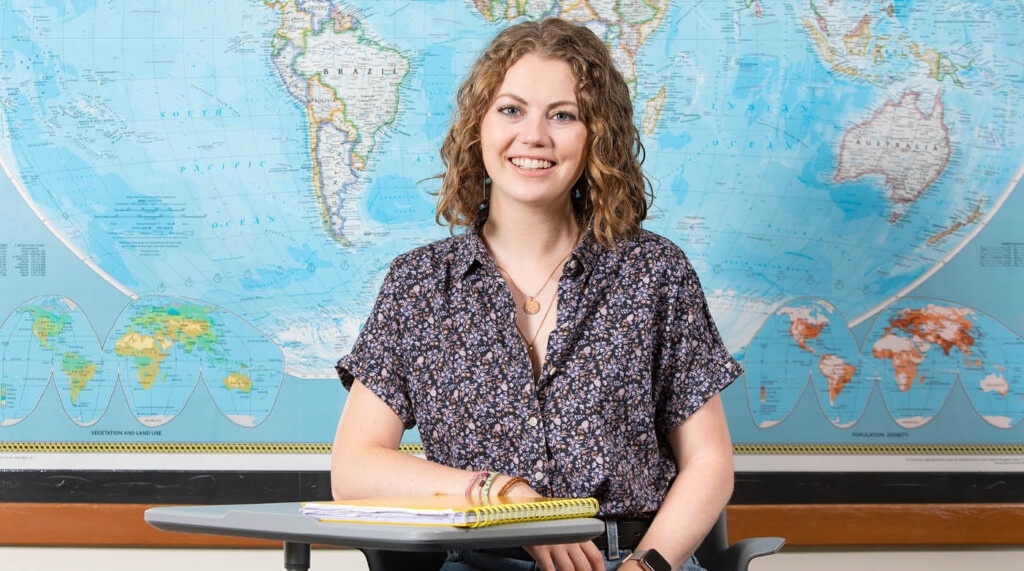Page 202 • (5,674 results in 0.042 seconds)
-
Carrie Hylander Carrie in Colombia where she completed her Fulbright PLU Class of 2012 Hispanic Studies and Global Studies Double Major Studied away in Oaxaca, Mexico and Granada, Spain Completed Fulbright in Colombia Now working on Masters in Elementary Ed. from UW At PLU I studied Hispanic Studies and Global Studies. I also completed my Teaching English as a Second Language Certificate through PLU. I studied away in Oaxaca, Mexico fall of 2009 and in Granada, Spain fall of 2011. With the
-
Heven Ambachew ’24 combines her passions and experiences to design major in innovation studies Like many students, Heven Ambachew ’24 wasn’t yet sure of her major when embarking on her PLU journey. Four years later, thanks to PLU’s individualized major pathway, she is the university’s first graduate with a major in innovation studies . Innovation Studies at PLU Courses… June 7, 2024
-

Angie Hambrick Angie Hambrick, Resident Instructor of Gender, Sexuality and Race Studies Phone: 253-535-8180 Email: hambriaz@plu.edu Professional Additional Titles/Roles Associate Vice President - Diversity, Justice, and Sustainability Education Ph.D,, Higher Education, Azusa Pacific University, 2020 M.S.Ed., College Student Personnel, Southern Illinois University, Carbondale, 2004 B.A., Public Communication, University of Wisconsin - Eau Claire, 2003 Areas of Emphasis or Expertise Critical
-

the reason that Ellie Dieringer ’23, a global studies and Hispanic and Latino studies double major, decided to pursue research in this area. Throughout her time at PLU, she focused her global lens on Latin America — specifically Argentina and Uruguay. “Part of what drew me to the research I’m doing is the relationships between institutions and the stories they decide to tell,” she explains. During her freshman year at PLU, Dieringer headed to Uruguay for a month-long study abroad trip. While
-
Stephanie Johnson Dean, College of Liberal Studies Full Profile 253-535-8397 stephanie.johnson@plu.edu
-
section. Where a person required to register under this section is in custody of the state department of corrections, the state department of social and health services, a local division of youth services, or a local jail or juvenile detention facility as a result of a sex offense or kidnapping offense, the person shall also register at the time of release from custody with an official designated by the agency that has jurisdiction over the person. In addition, any such adult or juvenile who is
-
Learning Outcomes*Effective January 2019* Upon completion of their degree, Religion majors will be able to: Explain “Religion” as a category of analysis in academic contexts, identifying when and how religious beliefs, interpretations, and practices shape human life, culture, and history, as well as how they change over time. Analyze religious traditions and expressions within their historical, social, and cultural contexts. Describe an array of academic tools or methods in the study of
-
www.plu.edu/healthsciences/ The overwhelming majority of students entering the professional schools for the careers listed below have earned baccalaureate degrees, each securing a broad educational background in the process. This background includes a thorough preparation in the sciences as well as study in the social sciences and the humanities. The Pre-Health Sciences Advising Team in the College of Natural Sciences advises students aspiring to careers in the health sciences. Students
-
relations, which are fluid rather than fixed. Therefore, one gender is not seen as dominant over the other, but one gender may be more prominent in certain contexts. In the artistic context, males are traditionally much more prominent than females. Especially in the art of woodcarving, which is considered the most important art form among the Yoruba. Among the Yoruba, seniority in social status and age are seen as dominant and deserving of respect, which is shown in a kneeling posture. This posture
-

inclusion, and of discerning one’s vocation and service in the world. Jen RudeUniversity Pastor“Lutheran higher education is the foundation for all the other values that we live. Lutheran higher education is the wisdom and the nourishment that supports those values and those ways of living together.” Rooted in Questioning “In order to understand the present, and ultimately the future, we must understand the tradition we’re rooted in,” says Marit Trelstad, endowed chair of Lutheran Studies and director
Do you have any feedback for us? If so, feel free to use our Feedback Form.


